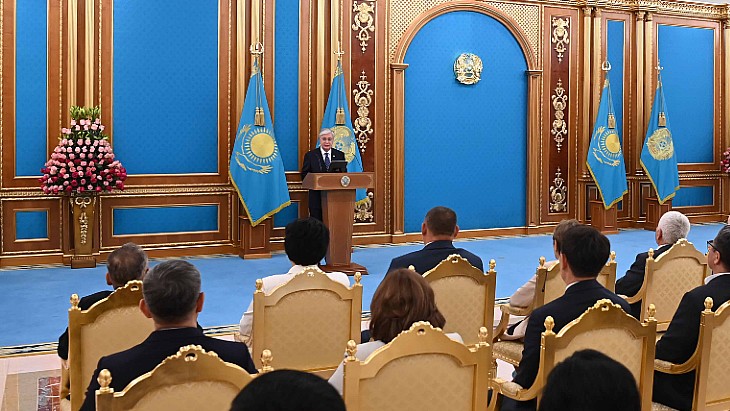Kazakhstan's nuclear energy referendum to be held this year
President Kassym-Jomart Tokayev has said that a referendum on plans for a nuclear power plant in Kazakhstan will be held this autumn.

(Image: President of the Republic of Kazakhstan's Office)
In a speech to media representatives in the country, the president said that "a stable source of energy is necessary for the development of the economy". He said there was "a comprehensive discussion" taking place about the proposed nuclear power plant with "different opinions" and he said the country's mass media "should also actively participate in this process".
He added: "There is a great opportunity to develop nuclear energy in the country. It should be used correctly, effectively. The people will make the final decision on this issue. The referendum will be held this autumn and the government will determine the exact date."
The potential reintroduction of nuclear power is aimed at reducing the country's reliance on fossil fuels, diversifying its energy mix and reducing CO2 emissions. Kazakhstan Nuclear Power Plant (KNPP), which has been designated as the owner/operator of the future plant, began preparing a feasibility study in 2018 to justify the need for nuclear power, the choice of the location for plant construction and to review the plant's projected power output.
Although a positive result in the referendum will be needed for the project to go ahead, some details of the proposed plan have already been emerging, with the World Nuclear Spotlight event in April in the country hearing that a site at Ulken, on the shores of Lake Balkhash, had been identified as the most suitable location, with Kurchatov as a backup region. The proposed first nuclear power plant would be a large reactor but there are also options for using small modular reactors to replace retiring coal plants in the years to come. The government's target is for nuclear to produce a 5% share of the national generation mix by 2035.
The background
Kazakhstan has 12% of the world's uranium resources and in 2022 it produced 43% of the world's uranium. It has three operating research reactors and a Russian-designed BN-350 sodium-cooled fast reactor operated near Aktau for 26 years, until 1999.
In November 2023, an International Atomic Energy Agency team conducted a five-day Site and External Events Design (SEED) mission to review the country's site selection process. In January 2023, the Ministry of Energy said that four foreign potential suppliers of nuclear technology were being considered - EDF of France, China National Nuclear Corporation, Korea Hydro & Nuclear Power and Rosatom of Russia.
Researched and written by World Nuclear News
- China Institute of Atomic Energy
- Nuclear Power Institute of China
- Southwestern Institute of Physics
- China Nuclear Power Operation Technology Corporation, Ltd.
- China Nuclear Power Engineering Co., Ltd.
- China Institute for Radiation Protection
- Beijing Research Institute of Uranium Geology (BRIUG)
- China Institute of Nuclear Industry Strategy (CINIS)
- China Nuclear Mining Science and Technology Corporation


